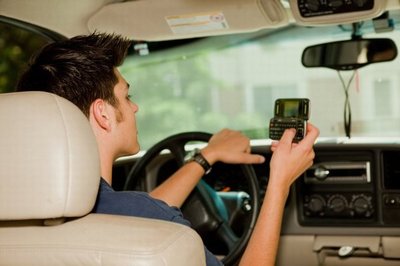April 8, 2010
UW Medicine pediatrician and injury-prevention researchers at Harborview play a role in new cell phone measure
We’ve all seen it — drivers talking on cell phones while speeding down the highway, or texting or reading messages when driving on city streets. But that may soon change in Washington state.
Gov. Christine Gregoire signed into law Friday, March 26, a measure that makes it a primary offense to be caught using a cell phone while driving. The new law—which goes into effect in June—includes reading, writing or sending text messages with a handheld device.
Dr. Brian Johnston, UW Medicine associate professor of pediatrics and chief of pediatrics at Harborview Medical Center, decided last spring to join a group concerned about drivers talking on cell phones and texting. The Driven to Distraction Task Force of Washington, as it is known, includes parents whose children have been victims of distracted driving, pediatricians and emergency physicians, crash-injury investigators and public health experts.
Johnston appears in a video created by the task force and speaks about how his work inspired him to get more involved in the topic. More specifically, while working one day last spring at Harborview, Johnston said he took care of several young patients involved in accidents related to cell phone use. “It was clear to me that we needed to do more to change social norms around distracted driving,” he said. “I was pleased to find a group of like-minded individuals from all walks of life who shared this belief and were willing to contribute their time and talents to making our roads safer.”
Johnston and colleagues from the Harborview Injury Prevention and Research Center—including crash investigator Rob Kaufman and graduate student Sharon Berlin—also served on the task force and contributed research.
According to the research, talking on a cell phone is just as distracting as driving drunk. What’s more, 15 percent of drivers in school zones are visibly distracted, most commonly with a cell phone. “We just want to make the streets safer for everyone,” Johnston said in the task force video.
What’s really changed with the new law? Johnston said making the ban on handheld cell phone use and text messaging a primary offense is what changes everything. “This means that law enforcement officers can ticket drivers for this behavior alone,” he said. “It’s an important change—cell phone and texting rates have been increasing despite our secondary enforcement laws and police officers have been asking for this change.”
As a pediatrician, Johnston said he is most enthusiastic about a new ban on all cell phone use—both hand-held and hands-free—as well as texting for teen divers under 18. “This is a high-risk group and also among the most likely to use a cell phone in the car,” he said. “They don’t need any distractions when they are developing driving skills. This new provision in the law sends that message clearly.”

